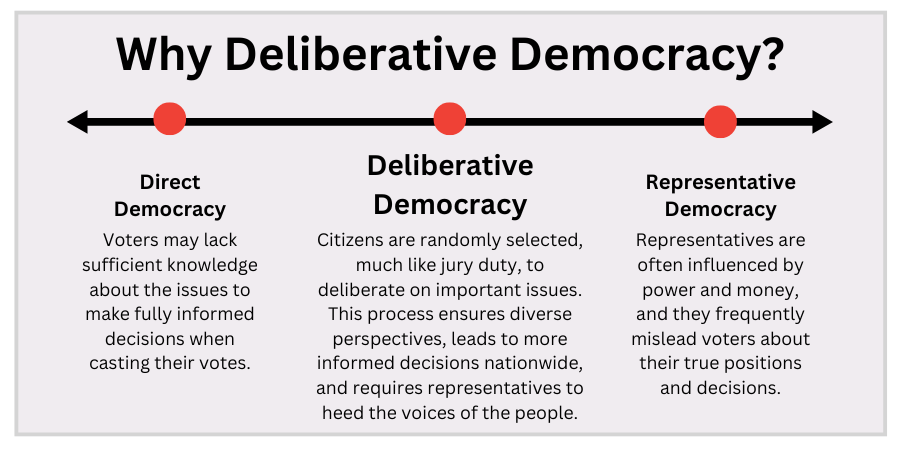A New Path for American Democracy
America is at a breaking point. Political polarization is deeper than ever, trust in government has plummeted, and congressional gridlock makes meaningful progress nearly impossible. Misinformation spreads faster than facts, and politicians often prioritize party loyalty and wealthy donors over the needs of everyday people. Our democracy isn’t just struggling—it’s at risk of being replaced by autocracy if we don’t take action.
We need a new approach, one that avoids the pitfalls of both direct democracy and traditional representative democracy while ensuring that all Americans are fairly represented.
Deliberative democracy offers a way forward. By bringing together everyday citizens from all backgrounds to study issues, hear expert testimony, and engage in meaningful discussions, we can build a government that truly reflects the will of the people. Instead of policies being shaped by partisan politicians or uninformed voters misled by attack ads and soundbites, deliberative democracy ensures that decisions are made based on informed, diverse perspectives.
This article will:
- Explain why our current system is failing
- Define deliberative democracy and how it works
- Show how deliberative democracy can solve many of our political and societal challenges
- Outline a plan for implementing deliberative democracy in the U.S. government
It’s time to rethink how we govern and reclaim democracy for the people.
The Failure of Our Current System
Right now, our democracy faces several major challenges:
- Extreme Partisanship – Political parties have become more polarized, making bipartisan cooperation nearly impossible. Politicians vote based on party loyalty rather than what is best for their constituents.
- Misinformation & Emotional Manipulation – Social media, biased news outlets, and misleading political ads make it difficult for voters to make informed decisions. Complex policy issues are often reduced to simplistic slogans that distort reality.
- Special Interests & Corruption – Elected officials spend much of their time fundraising rather than governing. Corporate lobbying and wealthy donors have an outsized influence on policy, drowning out the voices of ordinary citizens.
- Public Distrust in Government – Polls show that many Americans feel disconnected from their government, believing that their voices don’t matter. This apathy weakens democracy and fuels disillusionment.
What Is Deliberative Democracy?
Deliberative democracy is a system where randomly selected citizens come together to discuss important issues, hear from experts, and make recommendations that influence policy. In some ways, it’s similar to jury duty, but instead of deciding court cases, participants help determine laws and government decisions.
How It Works
- Random Selection of Participants – Citizens are randomly selected to participate in Deliberative Assemblies. The randomness ensures a diverse and representative group of people, rather than career politicians or activists.
- Studying the Issues – Participants are given time to learn about an issue, hear from experts on different sides, and discuss the implications of different policies.
- Deliberation and Debate – The group engages in structured discussions where they can weigh the pros and cons of different solutions.
- Recommendations to Congress – After careful discussion, the assemblies present their findings to their Representatives and Senators, who are required to consider them in policymaking.
The Benefits of Deliberative Democracy Over Direct Democracy and Representative Democracy
- Informed Decision-Making – Instead of voting based on gut reactions or party affiliation, deliberative assemblies allow everyday people to study issues in-depth, consult experts, and weigh different perspectives before making recommendations.
- Diverse Voices in the Process – These assemblies are randomly selected from each congressional district, ensuring a true cross-section of the population. This means policies are shaped by real people, not just career politicians or the wealthy elite.
- Less Political Manipulation – When decisions are made in a deliberative setting rather than through partisan campaigns, there is less room for misleading ads and emotional appeals that distort the facts.
- Holding Politicians Accountable – By requiring elected officials to respond to the findings of these assemblies, representatives can no longer ignore the will of their constituents. This forces Congress to engage with real public opinion rather than special interests.
Is Deliberative Democracy New?
Deliberative democracy has been successfully used in places like Ireland, France, and Canada to tackle complex issues that politicians avoided for years. When given the chance, everyday people consistently rise to the occasion, proving that democracy works best when citizens are directly involved in the process.
At a time when our current system is failing, deliberative democracy is the best path forward because it offers a practical, fair, and effective way to repair trust in government, reduce polarization, and ensure that policy decisions reflect the informed will of the people—not just the interests of the political elite.

How Is This Different from Direct Democracy?
Direct democracy, such as ballot initiatives or referendums, allows people to vote directly on laws. While this might seem like a good idea, it has major flaws:
- Voters may not have enough information to make the best decision.
- Complex issues get reduced to overly simplistic “yes” or “no” votes.
- Misinformation and campaign ads can easily sway public opinion.
Deliberative democracy keeps the public involved but ensures that decisions are based on thoughtful, well-informed discussions rather than emotional or uninformed voting.
How Is This Different from Representative Democracy?
Representative democracy relies on elected officials to make decisions on behalf of the people. While this system was designed to balance efficiency and public input, it has significant flaws:
- Politicians often prioritize donors, lobbyists, and party interests over their constituents.
- Elections are influenced by money, attack ads, and misinformation, making it difficult for voters to make fully informed choices.
- Once elected, representatives are not always accountable to the people and may break campaign promises without consequence.
- Gerrymandering and partisan manipulation distort fair representation.
Deliberative democracy ensures that decision-making is not left solely in the hands of politicians. Instead, it gives everyday citizens a direct role in shaping policy, free from the influence of special interests. Assemblies of randomly selected citizens engage in in-depth discussions, hear expert testimony, and deliberate on issues to create well-informed recommendations that reflect the public’s true interests.
How Deliberative Democracy Reduces Political Polarization
Political polarization in the United States is alarming. Conversations about politics, even among friends and family, often turn into unproductive arguments. Cooperation between political parties feels impossible. Many Americans feel that politicians prioritize partisanship over problem-solving.
Deliberative democracy offers a proven solution to reducing polarization by empowering real discussion, mutual understanding, and informed decision-making.
Why Is Political Polarization a Problem?
Political polarization creates several major challenges in our democracy:
- Gridlock in Government – When parties refuse to compromise, important legislation stalls, and problems go unresolved.
- Misinformation and Tribalism – People often get their news from biased sources, reinforcing their own views without exposure to different perspectives.
- Extreme Candidates and Policies – Politicians appeal to their party’s base, rather than the broader public, leading to more extreme policies and candidates.
- Distrust and Hostility – People view those with different political opinions as enemies rather than fellow citizens with shared interests.
How Does Deliberative Democracy Reduce Polarization?
Here’s how this process reduces polarization:
1. Encourages Face-to-Face Dialogue
Unlike online debates or partisan political rallies, deliberative democracy brings people together in person. Research shows that talking directly with people from different backgrounds reduces hostility and increases understanding.
2. Focuses on Facts Over Partisan Spin
Participants in deliberative assemblies receive neutral, expert-provided information on the issues they discuss. They are encouraged to challenge misinformation and explore all sides of a debate before forming an opinion. This makes it harder for extreme or misleading narratives to take hold.
3. Promotes Compromise and Consensus
In deliberative assemblies, citizens must work together to find common ground. Instead of being forced into rigid party positions, they engage in constructive problem-solving, leading to more balanced and widely accepted solutions.
4. Reduces the Influence of Political Parties and Special Interests
Deliberative democracy removes the pressure of political campaigns, lobbyists, and party loyalty. Citizens in these assemblies do not have to worry about re-election or pleasing donors. They can focus on what is best for the country, not just what benefits a political party.
5. Represents a Diverse Range of Voices
Because participants are randomly selected, deliberative assemblies reflect the full diversity of society—across political, racial, economic, and generational lines. This ensures that no single ideology dominates the discussion.
6. Ensures Transparency for the Broader Public
One of the key strengths of deliberative democracy is that it doesn’t operate behind closed doors. The process is designed to be fully transparent so that all citizens—whether they participate in an assembly or not—can see how decisions are made.
- Public Access to Deliberations: While the participants themselves are randomly selected, their discussions, expert testimonies, and final recommendations are made publicly available. This ensures that citizens can see how conclusions were reached and why certain policies are supported.
- Recorded and Livestreamed Sessions: Deliberative assemblies can be recorded or live-streamed, allowing the public to observe the process in real-time or watch it later. This openness builds trust and prevents misinformation about what happens inside the assemblies.
- Detailed Reports and Summaries: After deliberations, clear and accessible reports summarizing key findings, debates, and final recommendations are published. These documents help inform the public and ensure accountability.
- Opportunities for Public Feedback: Citizens who were not selected for an assembly can still engage with the process by submitting questions, providing feedback, or attending public forums that discuss the outcomes of the deliberations.
By making deliberative democracy a transparent process, trust in government decisions increases, and the public gains confidence that policies are being shaped by informed discussions rather than partisan manipulation.
Real-World Evidence: Deliberative Democracy in Action
Deliberative democracy has already been used in some countries to address politically charged issues:
- Ireland’s Citizens’ Assembly – Helped find common ground on divisive issues like same-sex marriage and abortion, leading to national referendums where citizens made informed choices.
- France’s Climate Convention – A group of randomly selected citizens debated climate policy and produced recommendations that influenced national environmental laws.
- Canada’s Citizens’ Assemblies – Explored electoral reform and other issues, demonstrating that everyday people can engage in deep, meaningful political discussions.
How Do We Build a Deliberative Democracy System in the United States?
The Democracy Bill of Rights is dedicated to helping people envision a better future for American democracy. To spark this vision, we’ve crafted ten hypothetical constitutional amendments, each proposing meaningful reforms. One of these amendments outlines a path toward adopting Deliberative Democracy.
In essence, this proposal calls for the creation of Deliberative Assemblies in all 435 Congressional districts. Each assembly would consist of 100 randomly selected citizens, ensuring that every community has a voice in shaping policy. This framework is inspired by the book Saving Democracy. These assemblies would:
- Gather diverse, randomly selected citizens to discuss key issues.
- Deliberate based on expert information and structured discussions.
- Send policy recommendations to their Representatives and Senators.
- Require Congress to consider these recommendations when making laws.
By incorporating deliberative democracy into the U.S. Constitution, we can break the cycle of polarization, restore trust in government, and create a system that prioritizes problem-solving over partisan warfare.

Leave a Reply